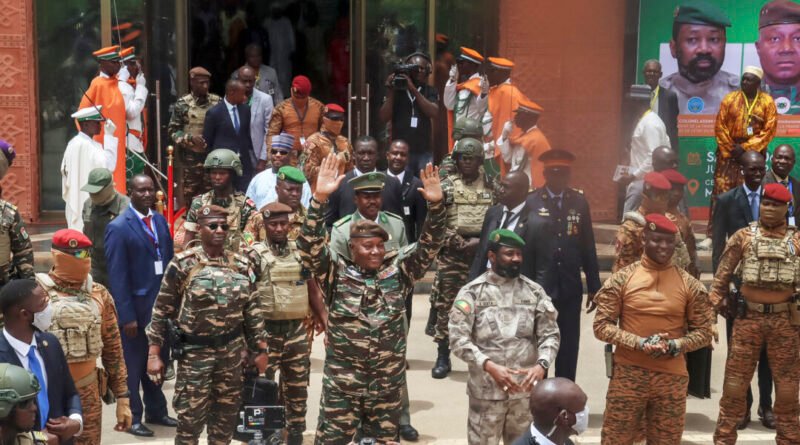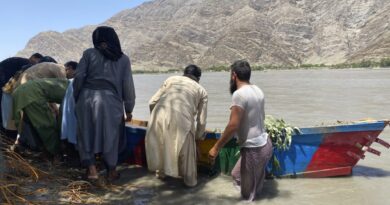Leadership split between the Junta Chiefs and ECOWAS creates uncertainty in the fluctuating Sahel region.
The military leaders of Mali, Niger, and Burkina Faso have recently departed to create a new alliance in response to a disagreement over the 15-member bloc’s stance on military takeovers.
On July 6, the military leaders of the three nations announced their definitive withdrawal from the 15-member bloc to form the Confederation of Sahel States.
All three countries have experienced jihadist violence, which has partly fueled the army coups.
The AES, akin to NATO in structure, upholds the principle that an attack on one member is seen as an attack on all.
However, they have since embraced some of the G5 Sahel’s initiatives—such as launching a joint airline—and have increasingly been seen as a tool to foster anti-Western and anti-French sentiments.
The G5 Sahel was established in 2014 as a regional intergovernmental organization to promote development and security in its five member countries of Chad, Burkina Faso, Mali, Mauritania, and Niger.
Security collaboration was the main focus of the AES leaders’ meeting on July 6.
Niger’s military leader, Gen. Abdourahmane Tchiani, reiterated the junta chiefs’ intention to create a community of sovereign peoples “free from foreign powers’ influence,” replacing ECOWAS.
Following suit, Burkinabé leader Captain Ibrahim Traoré spoke about the African continent’s historical and ongoing suffering at the hands of “imperialists.”
Sharing his thoughts on X, Capt. Traoré expressed their commitment to strengthening the pillars of their “true independence” together.
The junta leaders also discussed forging closer economic relationships, including introducing a common currency.
There are speculations that this move would involve rejecting the France-backed CFA franc, used in multiple states in the region.

Emphasizing the call for greater sovereignty and a rejection of former colonial power, the junta leaders have resisted ECOWAS’ demands for a swift return to civilian governance.
Concerns have been raised by analysts that the joint departure of the juntas from ECOWAS exposes the region to more instability and fragmentation.
“ECOWAS is the most advanced regional framework in Africa for promoting democracy and human rights,” Mr. Tiwana explained in an email to The Epoch Times.
“Leaders who genuinely prioritize their people’s well-being aim to reinforce, not undermine, the human rights frameworks outlined in international and regional agreements.”
David Otto, director of counterterrorism at the Geneva Centre of Africa Security and Strategic Studies and Africa Representative for the U.S. Antiterrorism Accreditation Board, believes that the defense alliance among the three junta-led states is a strategic move to protect each other from potential military interventions.
A confederation helps alleviate economic strain resulting from external sanctions and suspensions.
“In today’s geopolitics landscape, no nation can thrive in isolation,” Mr. Otto, a certified master antiterrorism specialist and NATO-recommended trainer for the Defence Against Terrorism Course, shared with The Epoch Times.
“Given that these three member states share borders in the Liptako Gourma triangle, the confederation and defense alliance become more effective in defense and integration.”
He pointed out that severing ties with ECOWAS, creating a tripartite defense alliance, and a confederation of states establish a collective defense mechanism against ECOWAS.
“A confederation not only shields these nations against regional sanctions and threats of invasion to restore democracy but also acts as a crucial deterrent against internal or external aggression towards its members,” he added.
He predicts that the safety and security of these member states and the region, as influenced by the alliance and confederation, will depend on the deployment of national security strategies, practical security measures, financial sustainability of the alliance and confederation, coordination among the three states, and effective communication strategies with their populations to sustain support for military rule.
“However, the extent of success also relies on how long they plan to stay in transition with an unstable economy amidst internal political opposition and external pressure to return to democratic rule,” he concluded.
ECOWAS leaders convened their own summit in Abuja a day after the junta leaders’ meeting to develop a “forward-looking contingency plan” regarding all possible scenarios with the AES.
The head of the ECOWAS commission, Omar Alieu Touray, warned that the juntas’ withdrawal from the bloc could lead to political isolation, loss of significant funding, restrictions on freedom of movement, and jeopardize the common market of 400 million people promised by the bloc.
Senegal’s newly elected leader, Basirou Diomaye Faye, received the responsibility of reinstating the three junta-ruled states into ECOWAS.
Mr. Otto considers this task challenging.
“If ECOWAS successfully persuades the three states to transition to democracy, the likelihood of their continued membership will increase. However, without a mutually agreed-upon transition plan, the chances of a committed reunion seem unlikely,” he remarked.
To sustain the anti-French narrative and portray French operations as ineffective against growing extremism in the region, Mr. Otto believes that an alliance of states facing a common regional threat is the appropriate structure to demonstrate readiness, regional unity, and international standing.
“This alliance not only seeks to attract external support for their military operations against jihadists but also provides a credible front for external backing of a confederation rather than individual nation-states,” he noted.
“The military leaders in the Sahel have used the former colonies’ post-colonial grip as a primary justification for toppling democratic governments. They have continuously fostered anti-French and Western sentiments to rally public opinion against France and the West as a whole.”
Maateuw Mbaye, protection and civic space officer at Article 19, an international NGO promoting freedom of expression and access to information worldwide, acknowledges the complexity and challenges surrounding the reintegration of the junta-ruled states into ECOWAS.
“Effective reintegration will necessitate a multifaceted approach, including diplomacy, security collaboration, economic incentives, and international backing,” Mr. Mbaye shared in an email with The Epoch Times.
“Future cohabitation depends on both sides’ willingness to compromise and work towards common objectives.”
He views the juntas’ departure from ECOWAS as a reflection of deep-rooted political disagreements and a lack of trust between the junta governments and ECOWAS.
“The Sahel region faces grave security challenges, including terrorism and insurgency,” Mr. Mbaye emphasized.
“The junta leaders may argue for a more effective security approach, while ECOWAS may prioritize democratic governance to achieve stability.
“Despite the potential benefits of a confederation, overcoming significant political, economic, and social hurdles will be crucial. Agreement on security strategies will likely be pivotal.”
On the other hand, Olusegun Alabi, a political science lecturer at Osun State College of Education in Nigeria, critiques ECOWAS’ handling of the political crises in Burkina Faso, Mali, and Niger as “careless” and “disrespectful” toward the sovereignty of these states.
“The confederation emerged out of necessity. Time will heal divisions, and sanity will eventually prevail. The political elites in each country will revert to their typical adversarial and directionless behavior,” Mr. Alabi conveyed in a phone conversation with The Epoch Times.





